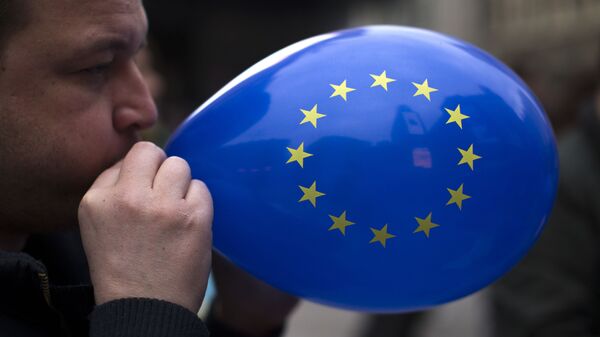The European Union can’t turn into a singular geopolitical power acting like a traditional state because that’s not why it was created in the first place, European University Cyprus Rector Kostas Gouliamos says.
“The EU is impotent to play a sufficient role within the framework of power relations and politics,” the academic notes.
Earlier, speaking at the Munich Security Conference on Sunday, EU foreign affairs chief Borrell, who became the EU’s foreign policy chief after Federica Mogherini completed her five-year term in office in December, suggested that the bloc should be more decisive in its foreign policy, saying that at present Brussels does not have the capability to throw its weight around in offering its own solutions on issues ranging from Israeli-Palestinian peace to the Venezuelan crisis, Libya or the Serbia-Kosovo issue.
“Europe has to develop…the willingness to act. To really act, not to be doing comments and saying every day that we really are concerned, very much concerned, extremely concerned. We should be able to act,” Borrell complained.
Europe Not Designed as a State
However, according to Gouliamos, it's misguided to seek state-like powers for the EU, since it doesn't have the traditional institutions of hard power such as police or military forces, which still belong to member states. From the beginning, the European project was assembled “against the practice of power politics,” he stresses.
Furthermore, Gouliamos notes, EU members remain deeply divided on a number of political matters, not just on issues related to foreign affairs, but internal problems caused by conflicts of interest between member states, and by efforts by EU bureaucratic bodies seeking to increase their influence in decision-making.
“For instance, it is worthy to note that Germany is kept back to allocate the EU’s institutions authority in terms of power politics, while France is more compassionate for the European Commission to utilize control over the Eurozone,” the professor says.
Despite its status as the world’s largest economy, the EU has struggled to make a concerted push toward a united political, military or foreign policy agenda, facing internal power struggles for influence, and discontent from smaller and poorer members accusing the big players of exploiting, dominating or otherwise mistreating them.
Uphill Battle
Ultimately, given that Brussels’ foreign policy is traditionally limited to “reactive” rather than “proactive” policy vis-à-vis the US, China and other actors, Gouliamos believes that EU foreign affairs high representative Josep Borrell’s comments about a Brussels with “an appetite for power” “reflects ambitious thinking” which would require “a long and difficult political process” to actually try to accomplish.
Borrell's comments followed months of bickering and frustration between major European powers and the United States after President Trump's decision to unilaterally withdraw from the Iran nuclear deal in May 2018.
Along with the Iran issue, some European leaders have called for a more nuanced approach to relations with Russia compared to their US partners. Speaking in Munich on Saturday, French President Emmanuel Macron called for a strategic dialogue between Europe and Russia to resolve some frozen conflicts, and address issues of common interest, from cybersecurity to the need to avoid the militarization of space. "I don't think we should abolish the sanctions, I'm just stating that the sanctions didn't work. Europeans suffer from sanctions as much as the Russians do and the result is not exactly positive," Macron said. The sanctions war between Russia and the West, begun in 2014 in the wake of the Ukraine crisis, have cost European businesses tens of billions of euros in lost earnings, while effects on the US have been miniscule thanks to more limited trade between Russia and the US before the crisis.

